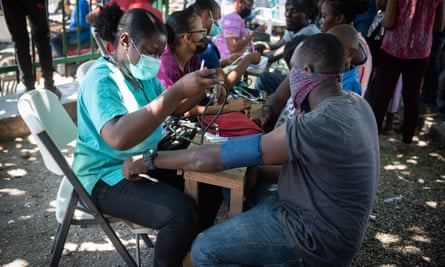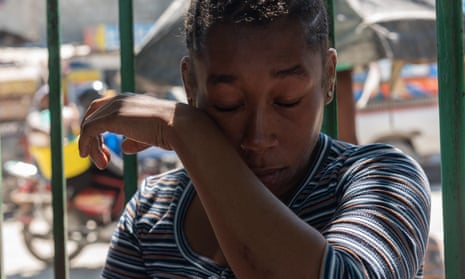Nearly 150 people have been killed and scores wounded during gunfights between warring gangs in Haiti, as the latest surge of violence has paralysed much of the sprawling capital, Port-au-Prince.
Médecins Sans Frontières (MSF) said on Thursday that it had treated more than 96 people with gunshot wounds in its medical facilities in Port-au-Prince since 24 April.
“The number of trauma admissions received per week tripled compared to mid-April, and most of them are very serious gunshot wounds that require extensive care,” said Mumuza Muhindo, MSF head of mission in Haiti, in a statement on Thursday. “The Haitian population is in an extremely vulnerable situation.”
Earlier this week, the National Human Rights Defense Network found that as many as 148 people had been killed during intense battles between the 400 Mawozo and Chen Mechan, two feared rival gangs.
During a bloody fortnight of battle, gang members raped women and girls and burned people alive, the organisation said in a report on Tuesday. In one neighbourhood, gangs killed 47 people before burning 17 of the bodies and burying the rest in mass graves.
“A massacre of incredible cruelty was perpetrated,” claims the report, which says that authorities did little to stem the violence. “At the highest level of the state, there was no reaction.”
Many residents fleeing violence have arrived to makeshift shelters, sometimes just a few blocks from their homes, where they face little humanitarian assistance and risk exploitation, according to charities working in the capital.

Roadblocks have been thrown up in gang-controlled neighbourhoods across Port-au-Prince, preventing ambulances and aid vehicles from moving around. MSF reported that some patients they saw could only reach a hospital after delays of 24 hours, due to barricades manned by gangs.
Analysts say the upsurge in violence is also due to a growing dispute between the 400 Mawozo and G9 gangs, which intensified when the former invaded the latter’s territory.
“Occupying more territory would have given them more leverage to negotiate electoral votes and access to more businesses that can be extorted for protection,” said Louis-Henri Mars, founder and executive director of local peace-building organisation Lakou Lapè.
Haiti, the first black republic, has largely been plagued by violence, political instability and meddling from foreign powers since it bloodily won independence from French colonists two centuries ago.
Today the scene is particularly bleak as gangs – often with the tacit support of political and business elites – continue to wage war on each other, the authorities and civilian populations.
The country is still feeling the aftershocks of a string of overlapping crises last year. In July, President Jovenel Moïse was assassinated in his hillside home. A month later a 7.2 magnitude earthquake struck Haiti’s southern peninsula, killing more than 2,000 people and destroying tens of thousands of homes.
A spate of kidnappings – of rich and poor alike – paralysed much of the capital last autumn, while the deportation of over 10,000 Haitians from the United States’ southern border to Port-au-Prince added to the instability.
But the scenes in the capital, where murder, kidnapping and gun battles are a daily reality, have seldom been so bleak.
“This is the worst violence-related crisis we have ever seen,” said Fiammetta Cappellini, country director for Italian aid group AVSI. “More and more areas of the capital – usually considered ‘safe’ – are now battlefields; thousands of people are fleeing their houses.”
Violence in the Caribbean country looks unlikely to abate after the extradition of Joly “Yonyon” Germine, a leader of the 400 Mawozo gang, to the United States on Tuesday. Germine was charged in the US for involvement in the kidnapping of 17 members of an Ohio-based missionary organisation last October.
Cappellini added that the international community had for too long ignored Haiti’s woes. “Something has to be done now,” the aid worker, based in Haiti for over a decade, said. “Before it’s too late and the country spirals into hell with no way back.”
